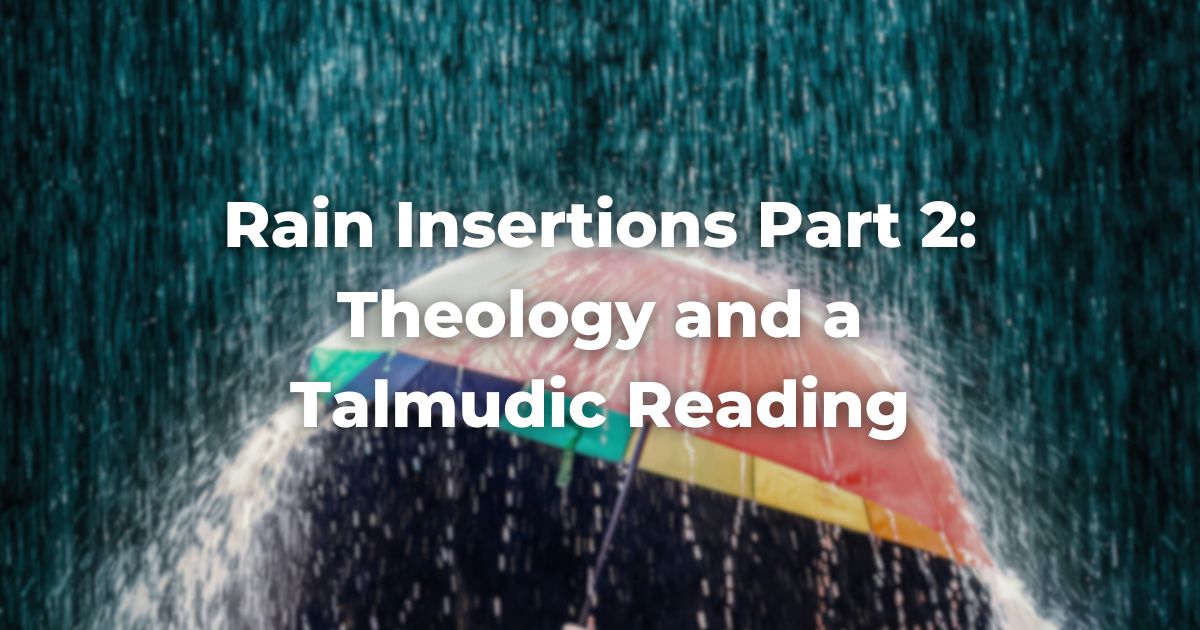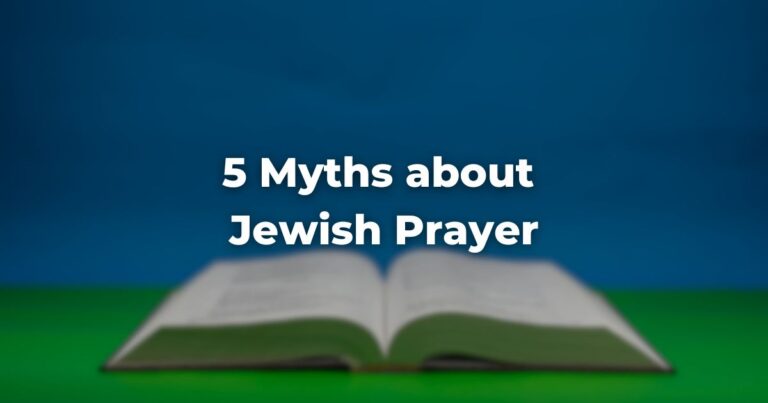In the previous essay, we saw how rabbinic tradition distinguishes mentioning rain (Mashiv HaRuach) from requesting rain (Ten Tal uMatar). But why bring up rain at all?
The TalmudReferring to one of two collections, the Jerusalem and Babylonian Talmuds, edited in the 6th century, that contains hundreds of years of commentary, discussion, and exploration of the ideas in the Mishnah. One could describe it as Mishnah + Gemara = Talmud Read more in masechet, tractate, Taanit offers a deep answer. In its opening sugya, section, the Talmud asks:
“?וּמְנָא לַן דְּבִתְפִלָּה”
“From where [do we know] that [one should bring up rain] in prayer?”
This standard rabbinic construction, “from where,” refers to a biblical authority that can justify the following behavior—in this case, rain insertions in prayer.But what seems here like a question of authority is really a more fundamental “why” question, with a Midrash serving as the answer:
דְּתַנְיָא לְאַהֲבָה אֶת ה׳ אֱלֹהֵיכֶם וּלְעָבְדוֹ בְּכַל לְבַבְכֶם אֵיזוֹ הִיא עֲבוֹדָה שֶׁהִיא בַּלֵּב הֱוֵי אוֹמֵר זוֹ תְּפִלָּה וּכְתִיב בָּתְרֵיהּ וְנָתַתִּי מְטַר אַרְצְכֶם בְּעִתּוֹ יוֹרֶה וּמַלְקוֹשׁ
Our Sages taught: “To love the Lord your God and to serve God with all your heart” (Devarim 11:13). What service is done in the heart? One must say that this is prayer. It then says [in the next verse], “And I will send the rain of your land in its time, the first rain and the last rain” (Devarim 11:14).
In other words, rain is the outward expression of the Jews’ relationship with God. You might recognize these verses from the second paragraph of the Shema, the subject of which is a Jewish theology of rain. This theology links divine reward and punishment to the weather: When we follow God, the rain comes in its time and we have agricultural prosperity; if we fail to do so, the rain is held back and there is famine. The fact that we are required to say this paragraph twice daily should give some sense of the centrality of this idea to Judaism. It is also an idea intimately linked to the agricultural cycle of the land of Israel.
Many of the world’s regions do not rely solely on seasonal rains for their sustenance. Some, like most of Eastern America, have plentiful precipitation year round, and some have large enough rivers or lakes to rely on for irrigation. The dry land of Israel, on the other hand, needs rain, and rain only comes at a particular time of year, by the grace of God.
In Israel, the Jewish people’s relationship with God is fundamentally communicated through rainfall, because God has direct control over our fortunes through rain. Conversely, our relationship with rain is made spiritual and personal, because we cannot rely on it as a mechanistic process; it has too much impact on our lives to trust in chance.
But the MidrashThis word is used in two ways, as both a concept and a literature. As a concept, midrash is the expansive interpretation of biblical texts. The term is used to describe the practice of rabbinic interpretation. As a text, it refers to specific collections of interpretations, particularly from the third to ninth centuries in the Land of Israel and Babylonia. Plural: Midrashim
Read more above has expressed this more eloquently than I could. Your spiritual relationship with God as a Jew, your “service of the heart,” is the essence of the theology of rain. It is essential that in our prayer, where we conduct this relationship with God, we recognize the importance of rain to that relationship.
In the previous essay we discussed the distinction of Rabbi Eliezer between mentioning rain and requesting rain. Once we accept his distinction, it becomes less essential for “mentioning” to be tied to real seasonal phenomena. The practice then becomes purely theological. After all, we are just mentioning rain—why not say it earlier, and why not tie it to the holiday cycle? So the locus of the discussion moves to the request for rain in Birkat Hashanim—and as we will see in the next article, into the Jewish diaspora.
Read on: Rain Insertions Part 3: Requesting Rain in the Disapora
Author
-

Nadav Elovitz has been involved in Jewish communities and Torah learning throughout his life. He has been a gabbai in the past but has never had any official credentials, though he is interested in a wide variety of topics related to Torah and the Jewish tradition. He is from the Boston area and works as an engineer by day.
View all posts




